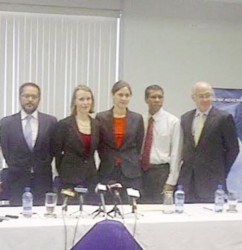Small and medium-scale enterprises (SMEs) may soon see increased access to loans as the Guyana Bank for Trade and Industry (GBTI) moves towards swift scientific analysis and processing of applications with the unveiling of a risk management project.
“We have to be more structured with data collection… the way we price loans is rather subjective and this project will bring very scientific ways to price loans,” Chief Executive Officer of GBTI John Tracey told reporters at a press conference yesterday at the Bank’s Kingston head office.
The Risk Management Initiative is funded in part by the Canadian government and will be implemented over the next two years by the Access to Finance Company.

While the cost of the project was not stated, Tracey assured that it was “good value for money”.
Canadian High Commissioner to Guyana Nicole Giles noted that while SMEs contribute to over 60 percent of the work force globally an estimated 65 percent of Guyana’s SME’s are un-served or underserved.
“Currently, an estimated 65 percent of Guyana’s SMEs are un-served or underserved by the country’s financial system, which limits their ability to grow and create jobs. This is a significant economic loss to Guyana, especially when we take into consideration that SMEs account for over 90% of all businesses in Guyana,” she said.
“SMEs consistently cite access to credit as one of the greatest operational barriers to flourishing businesses. SMEs are a significant contributor to the global economy, often employing more than 60% of the workforce. Yet, this sector is considered high risk and largely underserved by the financial community,” the High Commissioner added.
She said that her government was pleased to provide funding to the project as it believes that improving risk management is a key element of any comprehensive strategy to promote private sector development and, in turn, economic growth.
“We are optimistic that the outcome of this initiative will help GBTI to design a more comprehensive prediction model that is specifically tailored for the SME sector, one that is not only based on financial ratios derived from accounting data,” she said.
The High Commissioner stated that in Guyana many financial institutions are reluctant to get into and or expand SME lending because of the need to first implement the internal structures and procedures to identify and manage risk related to these transactions.
The International Finance Corporation (IFC) says that it will assist GBTI to assess existing policies to develop and support the implementation of an Enterprise Risk Management framework. This will include measures and models to access and mitigate credit risk, operational risk, liquidity risk, interest rate risk and market risk as well as organisational mapping and training staff.
The global development institution will also work with GBTI to strengthen its risk management practices to ensure the bank’s long term sustainability and build a strong foundation for its small and medium scale enterprise lending.




